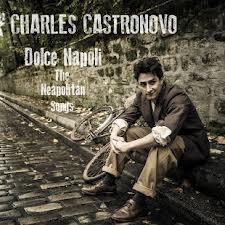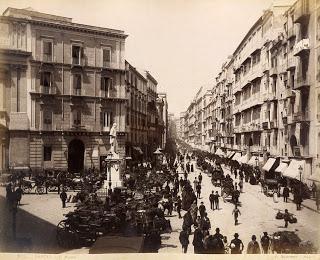 Even the cover art of Charles Castronovo's "Dolce Napoli" album sets it apart from the sun-flooded, pizza parlor kitsch that threatens to swamp such undertakings. If there is nostalgia here, it is anchored in historical specificity, and in performance, Castronovo honors the songs as living artifacts, rather than treating them like so many aural postcards. He is aided by Sweet Nectar, a band whose members' sensibilities are, like Castronovo's, influenced both by classical training and an upbringing shaped by the experience and music of family immigration. Alongside a few standards (Malafemmena, Core 'ngrato, Santa Lucia) are many less familiar songs, and Castronovo and Sweet Nectar prove adept at drawing out the emotional specificity in pieces relying on a limited number of tropes.
Even the cover art of Charles Castronovo's "Dolce Napoli" album sets it apart from the sun-flooded, pizza parlor kitsch that threatens to swamp such undertakings. If there is nostalgia here, it is anchored in historical specificity, and in performance, Castronovo honors the songs as living artifacts, rather than treating them like so many aural postcards. He is aided by Sweet Nectar, a band whose members' sensibilities are, like Castronovo's, influenced both by classical training and an upbringing shaped by the experience and music of family immigration. Alongside a few standards (Malafemmena, Core 'ngrato, Santa Lucia) are many less familiar songs, and Castronovo and Sweet Nectar prove adept at drawing out the emotional specificity in pieces relying on a limited number of tropes. As Castronovo observes in his liner notes (both informative and charming) the text of the songs is often ironically undercut by their melodies. The bemoaning of one's own suffering or the imploring of an unresponsive lover can be cheerfully mocked by accordion and guitar. Castronovo is attentive to these nuances, coloring his voice and the text accordingly. For me, this not only makes the disc a more interesting listen than it might have been, but pleasingly complicates the recurrent image of the Cruel Woman. An interesting, if indirect, commentary on this image is found in Glen Roven's translation of "Malafemmena," which replaces the apostrophe "Femmena" variously with "Salome," "sorceress," etc. Roven translates (freely) several of the songs; the stated objective is to make them more accessible, revisiting the common practice of the mid-century when the genre enjoyed a renewed vogue. To me, though, the disc's main attraction is Castronovo's distinctive voice, sweet, but also with a darkness belied by his boyish good looks. If interested in obtaining the CD for yourself, a friend, a lover, or your sweet Italian landlady (mine's getting one,) "Dolce Napoli" is available here and here.
As Castronovo observes in his liner notes (both informative and charming) the text of the songs is often ironically undercut by their melodies. The bemoaning of one's own suffering or the imploring of an unresponsive lover can be cheerfully mocked by accordion and guitar. Castronovo is attentive to these nuances, coloring his voice and the text accordingly. For me, this not only makes the disc a more interesting listen than it might have been, but pleasingly complicates the recurrent image of the Cruel Woman. An interesting, if indirect, commentary on this image is found in Glen Roven's translation of "Malafemmena," which replaces the apostrophe "Femmena" variously with "Salome," "sorceress," etc. Roven translates (freely) several of the songs; the stated objective is to make them more accessible, revisiting the common practice of the mid-century when the genre enjoyed a renewed vogue. To me, though, the disc's main attraction is Castronovo's distinctive voice, sweet, but also with a darkness belied by his boyish good looks. If interested in obtaining the CD for yourself, a friend, a lover, or your sweet Italian landlady (mine's getting one,) "Dolce Napoli" is available here and here.

